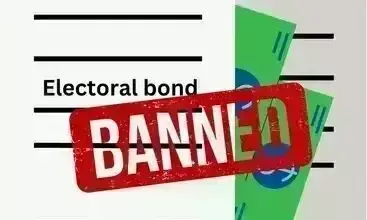Electoral bond scam: Former HC judge alleges Rs 2.5 crore taken for BJP donation, jobs never delivered
According to the complaint, the judge met Sarath Reddy and Narendra in 2021. He believed them to be important RSS leaders and purchased electoral bonds.

HYDERABAD: A retired High Court Judge DSR Varma, who was promised kickbacks in the form of jobs to his grandchildren, was conned by alleged RSS personnel. The judge was forced by two people to contribute Rs 2.5 crore to the BJP through electoral bonds.
In his complaint to the Film Nagar police, Varma claimed that he was promised that his grandchildren in the US would be given jobs in exchange for Rs 2.5 crore contribution to the BJP through electoral bonds.
According to the complaint, the judge met Sarath Reddy and Narendra in 2021. He believed them to be important leaders within the RSS and entrusted them with the money under the pretense of purchasing electoral bonds.
The judge, then 72 years old, withdrew the funds from his and his wife's accounts, believing the transaction to be legitimate.
However, after handing over the money, Varma alleged that he was unable to obtain the promised bonds or secure employment for his grandchildren despite repeated requests over the following two years. The complaint mentioned WhatsApp messages as evidence of the financial transactions.
The judge accused the individuals of violating the recent Supreme Court judgment regarding electoral bonds and misappropriating the funds for personal gain.
"Despite my insistence that bonds are issued to me, no such thing happened and collecting bonds without issuing them to me amounts to criminal breach of trust, criminal misappropriation, cheating etc," Varma stated.
Sarath Reddy's LinkedIn profile mentioned him as a coordinator for the World Hindu Congress and a participant in the World Hindu Economic Forum, an organisation associated with the RSS.
The Film Nagar police registered a case under Sections 406 (criminal breach of trust) and 420 (acts of cheating) read with Section 34 (acts done by several persons in furtherance of common intention) of the Indian Penal Code (IPC) and took up the investigation.



